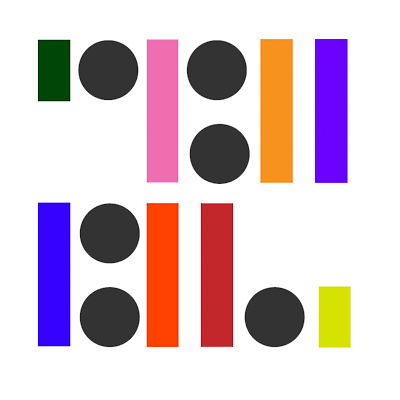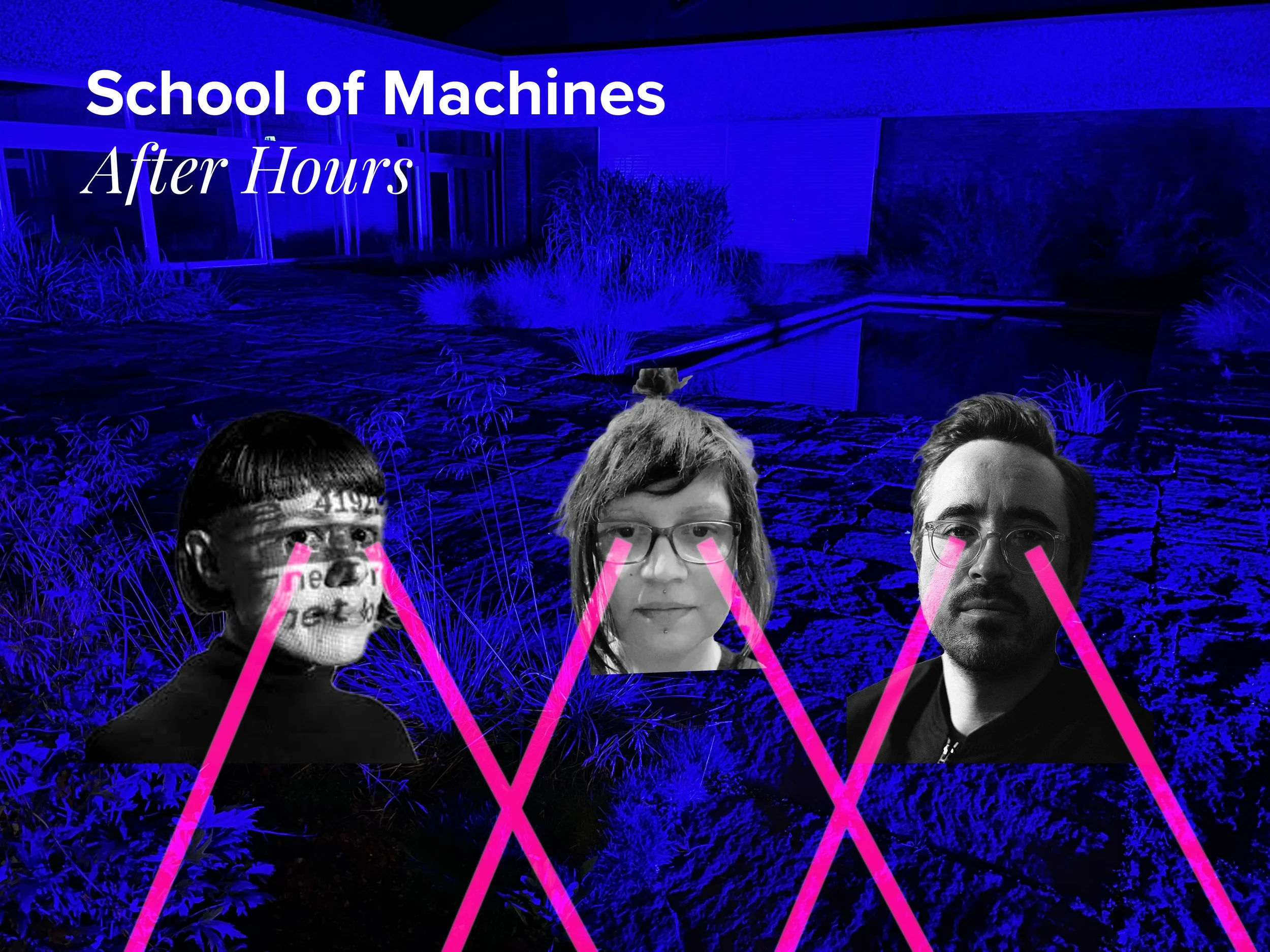Meet the Profs
This is a conversation between myself, Rachel Uwa, artist, educator, director of School of Machines, and two friends Sarah Grant, media artist, educator, and organizer of Radical Networks, a community event and arts festival for critical investigations and creative experiments in telecommunications, and Grayson Earle, a contemporary artist, activist and lecturer in universities across Germany and the US, as we discuss our upcoming 14-week alt-university semester program which will run in Berlin from February to May as part of School of Machines inaugural evening program After Hours.
I’m super excited to be creating this program with both of you! Before we get into it, can you both say a little about yourselves and your work at the intersection of art, education, and activism? I hadn’t thought about it until writing this up but that intersection seems to be what we all have in common. Well, we’re also all from the US and living in Berlin for several years. Lol. Personally, I’ve always thought of it as a great escape.
Grayson: It seemed like a good time to gtfo of the US. An old activist trick I learned while part of The Illuminator, which is a guerrilla video projection collective in NYC, is to “work backwards from the headline.” In practical terms this means what do you want the title of a newspaper article to be tomorrow, and how can you create a spectacle that will cause that to happen?
Technology is a great way to do that. With The Illuminator this meant projecting “Ultra Luxury Art, Ultra Low Wages” onto the Guggenheim when it was revealed that they were using slave labor to construct their Abu Dhabi museum, for example. Also, since The Illuminator is engaged in a form of street art, technology creates a sort of legal grey area because projecting a message onto the building is temporary, but the headline is forever.
Sarah: I've always been drawn to wanting to understand how things work - the protocols, networks, and other infrastructure that make communication possible rather than just what flows through them. Despite studying studio art, particularly sculpture and printmaking in school, when I got my first job as a flash developer for the web, it really drew me into the practice of taking a concept or visual idea and having to figure out how to make it work by translating it into code.
Since then, my work has ranged from building experimental hardware for mesh networks to organizing Radical Networks, which started as a way to bring together people doing critical work around telecommunications infrastructure. I teach courses on radical networks and alternative internet architectures because I think understanding how these systems actually work is a form of literacy that's increasingly essential, especially if we want to imagine and build alternatives to corporate-controlled platforms. Also it's just fun to have the skills to build your own digital tools and manifest your ideas just as you imagine them.
In the end what we’re doing is coming together to create a 14-week semester program that would encompass all the best parts of being in university and in community but without the ridiculous over the top fees and the elite separatism that often exists between admin, educators, and students. How would you explain in your own words what we’re doing and why we’re doing it?
Grayson: In a way it’s a crash course of things I wish I knew when I was getting started as an artist working with technology, all in one place. It provides a toolkit for people to take with them for the rest of their lives. 14 weeks gives us enough time to learn and apply a handful of skills, definitely enough to be dangerous. At the end of this people should feel comfortable to develop and exhibit a project, plus have some skills that could be developed into being commercially viable. I’m curious, what skills do you both wish you had learned earlier on?
Rachel: I was studying audio engineering at Columbia College Chicago back in the day and took a Max/MSP class which was my first real exposure to node-based creative tech. Shortly after I discovered Processing, OpenFrameworks, PureData, Arduino, etc., all around the same time. So I had no idea how to pick one tool and learn it well. In my defense, this was way before anyone was talking about ADHD.
I think this is partially why I started School of Machines; I desperately wanted more in-depth opportunities to learn new tools that went beyond what a weekend workshop or intro course could offer me. Because I was already taking all of those and yet I’d still find a circuit I’d soldered together in a workshop months before and think to myself, now what the hell does this thing do again? Lol.
So I wish I could have started off with a better overview, and cool peers to learn from that weren’t all just men trying to show off what they knew, and some mentorship and guidance that could have helped me focus rather than trying to learn everything at once while inevitably failing at all of it.
Sarah: I wish I had been less afraid to learn programming in general, and in particular, server-side infrastructure and systems administration much earlier. For years I was building interfaces and interactive experiences without really grasping how the underlying networks and servers functioned. Once I started digging into things like self-hosting, understanding protocols at a deeper level, and working with mesh networks, it completely changed how I approached projects. I also wish I'd learned earlier that you don't need permission to experiment with this stuff - you can just set up your own server, your own network, your own alternative infrastructure.
As is the current plan, we will be running two tracks and you both are leading one. Essentially, as per our discussions, we’re aiming to teach crucial skills, in particular for artists and activists, but really for anyone interested in how technology really works and how to setup and create their own tools and infrastructure to support themselves and their communities now and in the future; but even this can seem abstract. How would you break that down while sharing some of the highlights and aims and what distinguishes these two courses and approaches to learning?
Grayson: The courses are complimentary in the sense that Sarah’s deals more with the server-side end of things (like how to host your own LLM), while mine deals with the output of those systems (like how to creatively misuse an LLM). People could definitely get a lot out of taking both classes if they have time, but they are designed to be standalone. We were joking the other day about how our classes mirror the front-end/back-end divide in tech, but of course we are more interested in art and activism than building tech products. I think it’s kind of like Sarah’s class is “how to build a hammer” and mine is “how to hit a nail.” Fun fact, Sarah taught me how to self-host my web server, and now I do it for an art institution as a freelancer.
Sarah: We're essentially creating the kind of learning environment I wish had existed when I was starting out - rigorous, hands-on, community-based, without the gatekeeping. It's about building skills and infrastructure together, both technical and social. I would like people to leave feeling empowered to build their own tools, host their own services, and understand the systems they rely on rather than just being users of them. And honestly, doing this in community just makes the learning so much richer than struggling through it alone.
Grayson, how does your experience with The Illuminator and your other art tech activist projects (Bail Bloc/Why don’t the cops fight each other? etc.) reflect your approach to teaching and what you hope to impart to those who participate? What other hard and soft skills could they expect to get out of this?
Also, I'm curious though not sure if it’s relevant, but what did growing up on a farm teach you about giving a damn about the world?
Grayson: I think all of those projects share a fundamental goal of trying to reveal hidden structures, whether that be the structures that determine how public visual space is allotted, the way the justice system is set up to work against poor and marginalized people, or the source code that determines the behavior of police in a video game (or the real world). The great thing about teaching technology is that it is always revealing. I try to draw back the curtain enough for people to see inside. Technology feels opaque to most people, but we obviously live in an increasingly technologically mediated world, so the more people understand about these systems the better they can throw wrenches into the hard to reach places.
It’s also important to practice these things together, to learn and act discursively in a warm and welcome learning environment. Many people find it difficult to self-motivate, so having a shared structure and a goal to work towards, like a final project, is really helpful in honing new skills…
Growing up in the middle of nowhere is 100% the reason I became interested in computers. As for giving a damn, I am forever grateful to have discovered my sister’s punk rock music collection in my adolescence. What did it for you two? Was there a chance encounter, a good teacher, activist parents?
Rachel: Nice. Yes to all the things you said! I often think the best use of technology is to help expose us humans to ourselves. That in grasping that there are indeed hidden agendas and that technology can easily be used both for and against us, it can (hopefully) lead us to question the hidden agendas surrounding being human and how we are all ultimately being controlled.
I learned to give a damn because I grew up in an abusive home where everyone went to church on Sundays and pretended all was fine. Experiencing that hypocrisy not only in my family but within the society around me woke something inside me that once you see you cannot unsee. The way I dealt with it was to go out and help others, volunteering at homeless shelters and a local AIDS hospice; founding a citywide LGBTQ+ youth support group for others who were struggling, all while in high school.
This is also why I’m excited for this program. All these struggles are still alive in the world and the fight continues. But from experience I know that having a strong network of caring humans that support each other, and a communal desire to keep learning and striving to make a better world is what makes this all bearable . Here’s hoping! <3
School of Machines After Hours, a 14-week semester evening program takes place February to May, 2026 at School of Machines in Berlin, Mitte.
Interested in learning more? Join our info session!
Friday, 5. December, 17-19h., Veteranenstr. 21, vorderhaus 5th floor
For more info on the program itself and to sign-up: https://www.schoolofma.org/programs/p/early2026-after-hours <3

